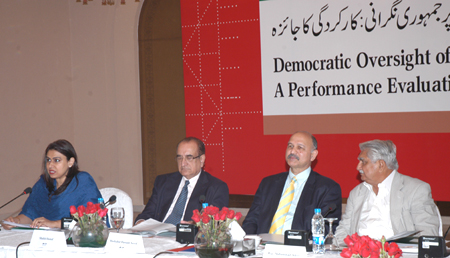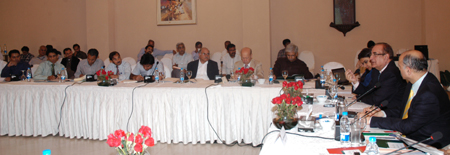|
|
| |
| EVENTS |
|
|
> Institutional Solutions sought for Civil-Military Relations; Counter-Terrorism Strategy should be first priority of new Government: Citizens Forum
|
|
|
| |
|
PILDAT Citizens Forum
April 03, 2013
Islamabad
|
|
| |
April 03; Institutional solutions for resolving civil-military relations in Pakistan have been sought in the past 5 years and the country has witnessed a movement forward in democratic control of defence and national security, said Senator Mushahid Hussain Sayed, Chairman Senate Defence Committee, while addressing the PILDAT Citizens Forum on Democratic Oversight of Defence and National Security: A Performance Evaluation by Citizens. |
|
| |
Awarding it 5 out of 10 marks, he said that the key flaw has been outgoing Government�s failure in developing a counter-terrorism strategy. This should be the top priority of the Government coming after May 2013 General Election. He said that democratic governments should be more knowledgeable and proactive in formulating defence and security policies.
|
|
| |
Senator Mushahid Hussain Sayed appreciated PILDAT for always serving as a link between Parliament and civil society on defence and national security issues. He also acknowledged PILDAT�s support for publishing Senate Defence Committee�s reports since June 2012. |
|
| |
Speakers at the Citizens Forum included Senator Mushahid Hussain Sayed, Chairman Senate Defence Committee in the chair, Mr. Shahid Hamid, senior Advocate Supreme Court; former Defence Minister, Senator Haji Muhammad Adeel, Vice Chairman ANP and Chairman Senate Standing Committee on Foreign Affairs and Ms. Aasiya Riaz, Joint Director PILDAT. |
|
| |
Mr. Shahid Hamid began by acknowledging PILDAT�s active role in making issues of democratic control of defence and national security as part of public discourse in Pakistan. Awarding it 4 marks on a scale of 10, Mr. Shahid Hamid said that some progress has been recorded in the past 5 years in this realm. However, he believed, activation and effective utilisation of existing forums is needed to establish effective democratic control of defence. Effective utilisation of higher defence organisation, including its 3 tiers of Joint Chiefs of Staff Committee, Defence Council and Defence Committee of the Cabinet is essential in this regard. He added that an empowered Defence Minister is the first step towards an effective Defence Ministry that can establish democratic control on defence in Pakistan. |
|
| |
Senator Haji Adeel said that it is due to the role of the military in combating terrorism and militancy in Pakistan that the ANP has begun to support the military. Military�s job, however, is just to defend the territorial borders of the country. Ideological debates and policies in this regard are firmly the domain of elected representatives of the people. He lamented that despite the return to democracy, defence and foreign policies of the country have not been under the control of elected representatives. |
|
| |
Senator Mushahid Hussain Sayed said that it is incorrect to suggest that only defence establishment is responsible for a lop-sided civil-military equation in Pakistan. He emphasised that effective democratic and parliamentary control on defence is possible when elected representatives are prepared to play that role effectively. |
|
| |
Presenting PILDAT�s analysis, Ms. Aasiya Riaz said that PILDAT�s objective behind carrying out analysis of performance of democratic and Parliamentary forums of defence oversight is to contribute to promoting democratic control and Parliamentary oversight on Defence and National Security in Pakistan. PILDAT analysis is carried out to examine the exercise of available Constitutional and legal powers of these Committees.
Discussing the performance of Defence Committee of the Cabinet, Ms. Riaz said that the DCC signifies the supremacy of elected executive in defining national security. Despite serious internal and external security challenges, the DCC met on an average of a little more than twice in a year in 5 years. It has proved to be a re-active rather than a pro-active forum. It only held 3 meetings in 2012-2013, all 3 focused on G-LoCs. PILDAT believes that DCC meetings should be held at fixed regular intervals; a permanent secretariat & dedicated think tank should assist the DCC; a National Security Advisor should coordinate the DCC and its first job in the next Government should be to prepare National Security and Defence strategies of Pakistan. She added that coordination of intelligence agencies should also be carried out under the DCC.
The National Assembly Standing Committee on Defence held 45 meetings in 5 years with an average of 9 meetings per year. It held most meetings on PIA and CAA. In comparison, the Senate Standing Committee on Defence, formed in June 2012, held 20 activities in 9 months including Meetings, Visit, Policy Seminars and Public Hearings. It has published and laid 4 reports in 9 months. It has an exclusive & updated website for public access. It also received briefing on defence budget.
The Parliamentary Committee on National Security held 84 meetings in 5 years and set an important tradition of Parliamentary review and input on foreign policy and national security. It, however, failed to provide any input on designing or guiding the Government on preparing a National Security Strategy. |
|
| |
PILDAT has launched 4 reports on the performance of the Defence Committee of the Cabinet, Senate and National Assembly�s Standing Committees on Defence and the Parliamentary Committee on National Security in Urdu and English languages. These can be accessed at:
- Performance of the Defence Committee of the Cabinet
[Download English, Download Urdu]
- Performance of the Senate Standing Committee on Defence and Defence Production
[Download English, Download Urdu]
- Performance of the National Assembly Standing Committee on Defence
[Download English, Download Urdu]
- Performance of the Parliamentary Committee on National Security
[Download English, Download Urdu]
|
|
| |
|
|
| |

|
|
| |
|
|
| |

|
|
| |
|
|
| |

|
|
|
|
|
|
|
|
|